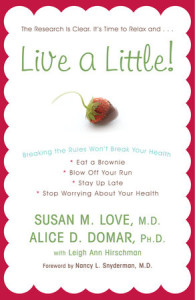
Sometimes I’m a little embarrassed about what the titles of books I pick up reveal about me. Titles like “Stop Yelling to Make Your Kid Listen” in the Parenting section, for example. “Unblocking Your Creativity.” “Cooking and Eating Better.” “Improving Your Energy.” “Improving your Libido.” “All Around Getting Your Act Together in 10 Easy Steps.” Why, at my age, am I still hungrily browsing the self-improvement shelves of my local bookstore or library? Why isn’t my act together already?
On the one hand, I asked myself, why do I need the advice of a doctor, even if it is Dr. Susan Love, even if she *did* write the book on breast health, and the book on menopause, and even if she does have her own research foundation, is considered a medical pioneer, and has made amazing strides in making women’s health advocacy public, mainstream, accepted, visible, and valued. Don’t I already know how to live? Isn’t that what my nearly four decades on the planet have been about — developing my *own* manual? Why am I succumbing, again, to that fatal belief that someone else can explain myself to me, someone else knows the secret to happiness/joyful living/serene acceptance/spiritual evolution, and if I just learn how they do it, I can apply that to my own life and improve immediately? Why am I constantly seeking advice elsewhere, outer, instead of relying on my own inner guidance?
On the other hand, isn’t that a fundamental part of our human journey–to learn from the wisdom of the more experienced, to listen to the advice of our elders, to talk to the women we admire and let their knowledge counsel, support, guide, and aid us? Part of the sisterhood surely must be acknowledging and valuing these oral, feminine, personalized systems of support. And in the strange configuration of our modern first-world lives, when extended family units have been replaced by nuclear households, when front porches and streets have been replaced by wireless connections and media that link individual units not by shared communal spaces but by social platforms, then buying a book is essentially the act that replaces the counseling over coffee or tea or a nice full glass of wine.
Recently, as my mother-in-law anointed a slivered toe of mine with a salve made from a secret age-old family recipe passed down from her mother, and her mother before her, from some ageless tub of salve shared among the generations of women in this family, I thought, who has this recipe? Will I inherit the tub of salve, in time? Can I be trusted with it? Will I be taught how to replenish it? Will I pass it to my own daughter? This is why we need the Old English charms, the medieval herbals, the early modern books of recipes and potions and healing effects. Human memory is faulty, oral transmission is only as reliable as its transmitters, we would know nothing of the OE charms today if they hadn’t fortunately been written down and even more fortunately more or less retained.
So yes, healing advice passed from woman to woman, good, all for it. Still, the admission of that title: I’m not sure I’m doing this right. I could stand to live a little more. Or, I want to know if other people have a better grasp on this than I do, and if so, I want to learn (and steal their secrets) from them.
Love and Domar’s Live a Little! is a corrective for all those women who have been listening to all of the health, wellness, fitness, and diet advice and are feeling overwhelmed, dejected, despondent, or just p.o.’d by how HARD it is to achieve the perfect diet and the moral rectitude of a virtuously BMI’d, regularly exercised body in a well-rested, optimally-functioning, mocha-free life. Love is an M.D., Domar a practicing psychotherapist, both are parents, and their book speaks specifically to women, which transforming-your-health books (or at least the ones on the shelves I’ve been browsing) only rarely do. Their message is ridiculously simple and supremely liberating:
You don’t have to be perfect. Don’t even start down that slippery slope.
Instead, settle for what they call “Pretty Healthy”—within, say, that 85% range, somewhere between truly self-destructive and all-ready-for-sainthood-minus-the-crown-of-thorns. My favorite piece of advice, right out there in chapter 1: stop feeling guilty or bad about yourself if you slip and, say, have two Hawaiian rolls—or four—with the can of non-low-sodium soup you opened because you were so busy writing you forgot to eat. You are going to have times when you give in to cravings, lose sleep at night, or feel tired and maybe a wee bit hungover after that rare night out with friends. These, the authors insist, “are the inevitable, even desirable, companions of a full life” (14).
I have no quarrel with this message. In fact I adore the down-to-earth, personable, realistic tone the authors take toward issues so many women face: feeling stressed out because you’re overloaded with work and feel like your domestic partner isn’t pulling the same weight, feeling stressed out because you’re trying to raise kids AND have a career, losing sleep because the baby has colic, the preschooler wants to chat with you at 2 in the morning (mine went through a long phase of this) or the teenager is out with the car. In fact I heartily endorse all aspects of their message: “trust your body and your good judgment” (24). After all, “know thyself” and “nothing in excess” are the fundamental ideals of Greek philosophy handed down to us from the dawn of time, and there’s some use to them.
But WHY ON EARTH DO WE WOMEN NEED SOMEONE TO TELL US TO RELAX, TRUST OUR BODIES, AND USE OUR OWN GOOD JUDGMENT?? Why aren’t we doing this all the time ALREADY???
It’s not just me being weird, perfectionist, or feeling I can always improve. There’s a perceived audience for this message—probably many of their patients. Their advice is sheer common sense. You feel stressed out because you feel the demands on you exceed your resources: so, sit down and think about your options. They sort through a number of studies that address various health topics for women—sleep needs (it depends on your own body), how often you need a breast self-exam (turns out, never), relational needs (no, one life partner is not going to “complete you,” to intuitively foresee and gallantly fulfill your every sensual, emotional, and spiritual need, so don’t even buy into that fantasy). Stop listening to the hype of a glamour/thinness/perfection-obsessed culture and focus on your “real goals,” whatever is important to YOU.
I needed to hear that. WHY did I need to hear that? Why don’t I simply rely on my own judgment all the time, instead of needing to double-check with someone or something else—the new friend, the magazine cover, the self-help book—to make sure I’m doing it right? Character flaw? Learned helplessness? Ingrained reflex to bow to the dominant cultural authority rather than my own inclination or path of experimentation?
The book is, incidentally, full of other good advice, about eating well, cultivating give-and-take in relationships, and getting a good night’s sleep. One of my favorite chapters broke down the exercise myths and helped me understand what to focus on if I want the much-lauded benefits of regular exercise but don’t have time to take off for an hour and run around the block or go to Pilates or that new sweaty yoga class. (Do you know what METS-metabolic equivalents-are? I didn’t, but I like the idea.) But the advice, again, boils down to: use your own common sense. Trust your own wisdom. Listen to your own body and do what it needs. Use this guidance when exercising, when eating, when communicating with your friends.
It’s come to this: we’ve been made completely crazy by ubiquitous advice on how to enhance, improve, or beautify our lives. Really, I think most of it is well-meant. Don’t you want a House Beautiful? Here’s how. Wouldn’t it be fun to have adorable cupcakes to send to your preschooler’s class for a treat? Here’s how to make and decorate them. Of course you want to be healthy—like this model right here on our magazine—so buy our issue and we’ll tell you how. But it’s not the noise making us crazy: it’s us, not being able to sort through the noise, to pull back and listen to the inward, quiet voice. I’m using the “we” here but it’s the royal we; I’m sure there are plenty of women (and I know some of them) who don’t get sucked into the whole how-to-be-better-than-you-already-are mindset.
This is something else we’ve lost, perhaps, in the switch from the salve tub that gets handed down through generations to the shiny self-help section of the bookstore. From the continual support that came from the females in your daily life as you shared tasks of tending the fields, tending the babies, tending the animals, making the bread, to the fragmented minutes spent checking social media or e-mail or Internet groups on the commute to and from the cubicle, or the office, or the school room. We have to purchase or enlist our support rather than having it built in already to our daily tasks.
There is much we have gained from the switch, of course: freedom from repressive cultural norms, some public acknowledgement of gender inequality, far more choice and opportunity. There are so many different and varied ways to live nowadays that we have to be told to step back, take a breath, monitor our own balance. If there’s any message than can help restore our collective sanity, it’s the advice Love and Domar give in this book. We’ll all, finally, be a lot healthier, saner, wiser, and happier when we learn to listen to our bodies, trust our own judgment, and rely on common sense.
Ridiculous, that we need to be told that. But maybe, if we’re told it enough, it will start to sink in.

